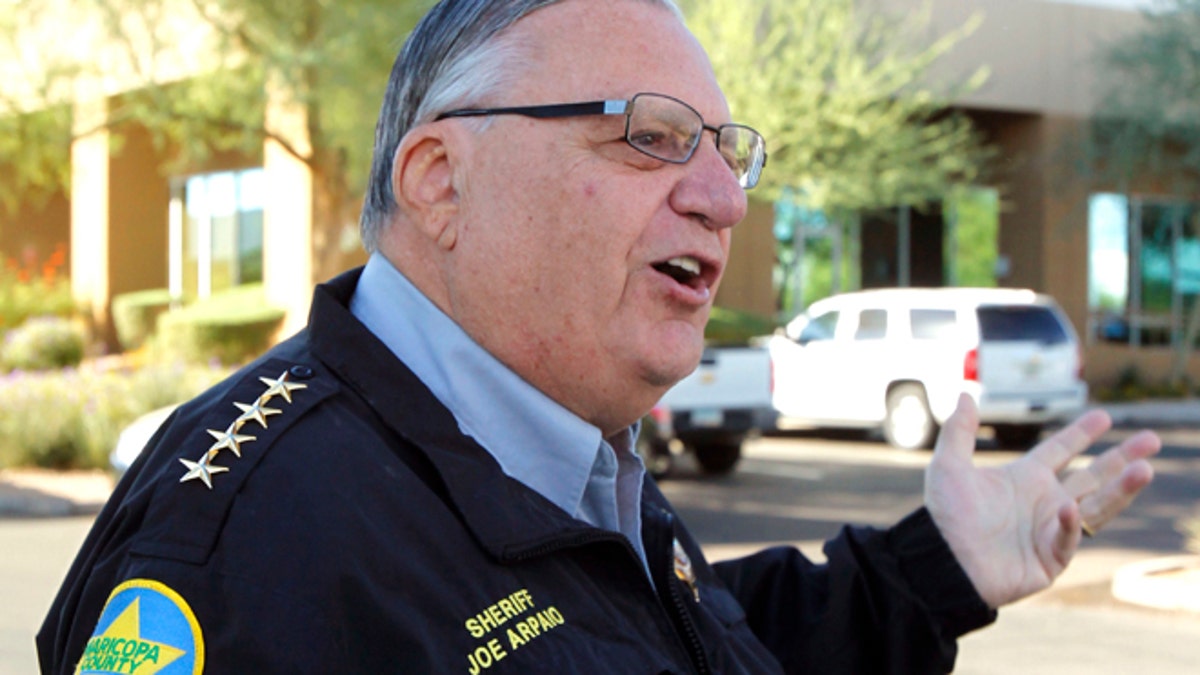
Maricopa County Sheriff Joe Arpaio speaks to the media on Nov. 1, 2011. (AP Photo/Ross D. Franklin, File)
PHOENIX (AP) – Armando Gutierrez was headed to Las Vegas with cash from his 2011 tax refund when he and his friends were pulled over by a sheriff's deputy.
Deputy Charley Armendariz found that the driver and another passenger had a small amount of pot and spotted nearly $5,000 in the glove box. He seized the money and arrested Gutierrez for having an outstanding warrant for fishing without a license, the police report said.
"He kept saying, 'I know you are a drug dealer and you are going to pick up the pot,'" Gutierrez recalled. "I told him, 'Dude, we are headed to Vegas.'"
Gutierrez spent about 10 hours in jail and wasn't charged with a crime arising from the traffic stop. But he didn't get his money until nine months later — and only after a series of emails were sent to the deputy, Maricopa County Sheriff Joe Arpaio's office and others.
The episode underscores an ongoing complaint by Latinos in the Phoenix area that cash in their possession turned up missing during arrests by deputies. The complaints come from U.S. citizens like Gutierrez but are more common among immigrants who are in the country illegally.
- Best pix of the week
- Latino celebs dress up for Halloween
- Even In Alaska, Immigration Takes Center Stage At Senate GOP Primary Debate
- Maricopa County To Pay $4.5M In Plaintiff Legal Fees In Sheriff Arpaio Profiling Case, Judge Rules
- Arizona GOP leaders work to recruit conservative Latino talent to keep state red
The allegations are emerging as Arpaio's office investigates whether Armendariz was shaking down immigrants who were in the country illegally.
Armendariz was arrested in May after investigators found more than 150 driver's licenses, bags of evidence and more than 100 license plates at his Phoenix home. He said he was innocent and implicated former colleagues on Arpaio's immigrant smuggling squad.
Officials say Armendariz was later found dead in his house in a suicide by hanging.
A court hearing is scheduled Tuesday for attorneys to discuss the sheriff's investigation.
Several lawyers and advocates said they have heard dozens of complaints of missing money over the years from immigrants who were stopped by deputies. Mexican officials say they fielded about 10 calls last year from detainees in Arpaio's jails about missing property.
Arpaio's office, which disputed the allegations, said it receives one or two complaints a week of missing possessions from people being released from jail, but they rarely complete forms documenting their grievances.
The agency added that those complaints arise from arrests made by both the sheriff's office and other police departments that book people into the county's jail system.
It's unclear whether the complaints are attributed to theft or mismanagement of personal belongings that are taken away when people are booked into jail. But efforts by some immigrants to get back their money were to no avail, the attorneys said.
Lawyers say immigrants are easy prey for such abuses. They carry cash because many are often paid under the table, have difficulties opening bank accounts in the U.S. and worry that making complaints will result in deportations.
The attorneys also say it's nearly impossible to prove that an officer stole a client's money.
"They are afraid of death to complain," said attorney Lance Wells, who estimates his firm has heard missing money complaints from about 100 immigrants in cases brought by Arpaio's office. Wells said he has made some efforts to recover his clients' property, but often doesn't succeed.
Arpaio criticized the lawyers who are making the missing money complaints. "A good lawyer would have reported this immediately if there were problems," Arpaio said.
The sheriff's office said the missing money complaints are unsubstantiated but noted anyone can bring similar grievances to a court-appointed official who is monitoring the agency after a judge found it systematically racially profiled Latinos.
The agency's cash-handling practices have previously been called into question. Federal prosecutors in 2011 examined complaints about the agency's management of an account that held cash taken from inmates during booking and money deposited by inmates' family.
In the end, prosecutors declined to bring charges, saying the money was mostly accounted for and that there was no evidence of embezzlement.
New procedures were enacted, however, such as a kiosk deposit system aimed at reducing cash-handling by sheriff's employees. The system allows inmates to deposit cash when they are booked, get cards showing their balance and redeem them at their release.
For Gutierrez, it ended up being a long ordeal to find his money. His attorney, Herman Alcantar Jr., provided the AP with emails showing his effort to get back Gutierrez's cash.
Armendariz responded to one email, but Alcantar said the deputy didn't reply to subsequent emails. Finally, the money was returned after the attorney emailed a sheriff's official with a threat to file a legal claim if the money wasn't returned.
Sheriff's spokesman Brandon Jones said the agency wasn't able to say why it took so long for Gutierrez to get his money back. "I don't have a deputy to ask," Jones said.
Follow us on twitter.com/foxnewslatino
Like us at facebook.com/foxnewslatino
